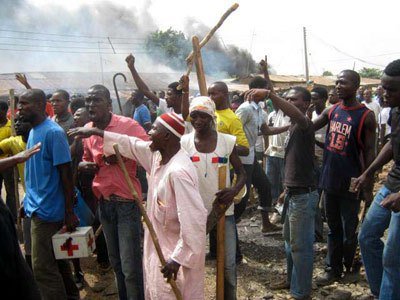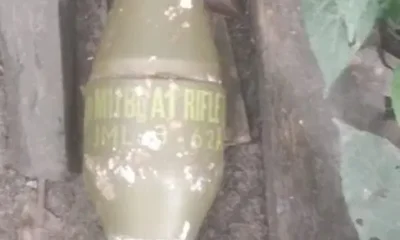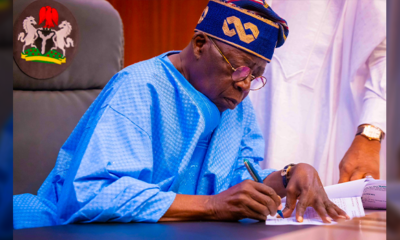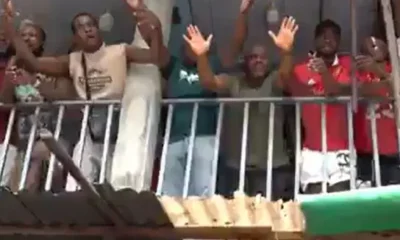Latest News
Tiv/Jukun crisis: Revisiting the 2003 Jalingo resolution on peace & reconciliation (Opinion)

BY: RIKWENSE MURI
This is not the best time for Taraba state as everyone is now overwhelmed by the ongoing armed conflict between Jukun and Tiv. President Muhamadu Buhari’s call for peace and directive to the Secretary to the Government of the Federation on 30th August 2019 to set up a holistic stakeholders team to come up with a lasting solution to the crisis is a prove that what began as a village squabble in Kente town on April 1, 2019 has become a national security issue. We should see this federal government effort as the replica of the South Africa’s Truth and Reconciliation Commission of Bishop Desmond Tutu and his team. Truth must be told in a way that sustainable peace will become a reality. Hence my recommendation for us in a effort bring about lasting peace, to revisit the 2003 Jalingo Resolution on peace and reconciliation between the Jukun and Tiv in Taraba state.
Jalingo Resolution is a joint peace pact signed by both Tiv and Jukun stakeholders including Traditional rulers, elders, political, church, community and youth leaders from both communities in Taraba and Benue states on August 31, 2003. The document was signed with the blessings of His Royal Highness Aku Uka Shekarau Angyu Masaibi Kuvyo II, and His Royal Highness Orchivirigh Dr. Alfred Akawe Torkula, Tor Tiv IV. However the document has not honoured or implemented by the Taraba State government for reasons best known to them.
I believe this document if implemented will bring about lasting peace without much resources expended on more academic exercise that will still arrive at the same thing by whatever committee or commission of inquiry into the crisis. This is because the document came about after two years efforts from September 1, 2001 with wide consultations among both Tiv and Jukuns. Series of consultations and workshops on peace and reconciliation among the the various opinion leaders was organized in Mkar, Wukari, Abuja, Gboko, Makurdi, Suntai and Jalingo by the Peace, Justice and Reconciliation Committee of the Reformed Ecumenical Council of Nigeria (RECON) and its implementation Committee (IC). They were assisted by the Christian Reformed Church of North America and facilitated by Professor Hizkias Assefa of the African Peacebuilding and Reconciliation Network. The final consultation before the peace pack was signed was a joint peace conference held between August 28 and 31, 2003 in Jalingo, Taraba state capital.
Having examined thoroughly the causes and consequences of the conflicts and armed confrontations that have been ruining the communities of both Jukuns and Tiv; having identified the mistakes done in the past and expressing their remorse but also exchanging their sincere forgiveness to each other; determined to create a new a new Chapter in the lives of their communities especially for their children who have suffered from insecurity, hatred, loss of education, employment and in general, lack of a promising future as a result of the recurrent conflicts and wars that have taken in their communities, 51 Jukun and Tiv stakeholders and 9 Witnesses from the State, National and international organizations, signed the August 31, 2003 Jalingo Resolution on Peace and Reconciliation Between Jukun and Tiv in Taraba state, Nigeria.
In order not to be misquoted or be accused of misquoting this special historic document, I will quote them as written in the pack. The content of the agreement was as follows:
1. We commit ourselves to work together hand in hand for the establishment of durable peace and reconciliation in our respective regions in Taraba state, Middle Belt Region of Nigeria. We hereby take responsibility, starting with ourselves, to inculcate in our respective communities the value and need for peace, reconciliation and harmonious coexistence. We undertake to work individually and collectively to diffuse tension between our peoples and to seek peaceful channels to address any grievances or differences that might arise so that they do not degenerate into unhealthy ran our and violence.
2. We acknowledge that the Tiv people who have traditionally resided in Taraba state would be considered indigenes to the land and have commensurate rights and responsibilities. Any other persons who move to Taraba from other states for purposes of farming should follow and abide by prescribed traditional and legal requirements for the acquisition of land in the area. We also agree to work with our people’s to stop the practice of greedy acquisition of more farmland which has the potential of squeezing other residents out.
3. We recognise that lack of respect for each other’sculture and failure to recognise traditional authority in Taraba has caused a great deal of animosity and conflict among our peoples. We hereby agree to work with our respective communities to recognize and accept traditional and constituted authority in The former Wukari Division of Taraba. We also undertake to help our peoples learn about each other’s cultures and traditions, as well identify some of the cultural practices that are obstacles to community coexistence in order to find mechanisms to deal with these practices so that our communities could live with each other with mutual respect. To assist in this regard, We request cultural associations to promote understandingby involving Jukun and Tiv people in each other’s festivals and public cultural practices.
4. We commit ourselves to cooperate with each other to bring about the material and social reconstruction and development of our ruined communities in former Wukari Division and elsewhere. To this effect, we shall collectively work to mobilize private as well as local, state and federal government resources and assistance.
5. We hereby agree to conduct our economic relations in such a way that we include and support each other for mutual gain (such as entering in joint ventures ) in order to avoid jealousy and unhealthy competition that can bring a downfall for all of us.
6. We agree that all residents of Taraba should pay legitimate taxes, levies and dues to appropriate authorities. Revenue collection must be legal, transparent and properly receipted.
7. We commit ourselves to report to proper law enforcement authorities people who commit crimes in the names of our respective communities or behave in ways that could spark ethnic conflict so that such people are prosecuted or restrained and ethnic relations in our region are not damaged.
8. We agree that from now on, traditional names of villages, towns and markets should not be changed without consultation between the leaders of both communities. Any existing disputes over change of names should be handled locally through consensus in the effected communities.
9. We agree to share elected and appointed offices in our regions in Taraba equitably. We resolve to support political candidates for office in local, state or federal government positions across ethnic lines not just on the bases of ethnic identity but on the bases of the candidate’s capacity to bring about development and prosperity for our communities and his/her integrity to uphold justice and fairness in our in region. There are precedents of this kind of political relationship among ourselves in the past, going as far back as the 1950s. We agree to learn from the mistakes done in the past so that we avoid the consequences that have bitterly divided our communities politically along ethnic lines.
10. We recognise that years of mutual suspicion, fear and animosity cannot be erased overnight. We are committed to work towards the elimination of these barriers by undertaking the following confidence building measures:
A. We commit ourselves to improve our interpersonal relationships across ethnic lines i.e., to visit one another, to socialize with each other individually and in group, to do things together, etc so that our people also begin to emulate our behaviour and break the barrier that the conflicts in the region have erected between them.
B. We hereby call upon our traditional Rulers, Elders and church leaders to intervene to reunite families that had been separated or divided as the result of the violence and conflicts in our communities.
C. We call upon our religious leaders to take an active role in promoting reconciliation and unity among our people’s at all levels of our communities. They should lead us by example and encourage prayers and fasting for reconciliation and unity. We request them to help us to worship and fellowship with each other without regard to our ethnic background. We specifically call upon the relevant leaders of the Reformed Church to work to bring the three denominations of NKST, CRCN and RCCN together.
11. We hereby call upon our state government of Taraba to assist, in whatever way possible, our efforts in establishing durable peace and reconciliation in our region. We request the government to expedite the demarcation of the boundary between Taraba and Benue since that has been the source of several conflicts in the past.
12. We have hereby created follow-up committees for each of the two affected local government areas of Wukari and Donga in order to pursue the implementation of agreements in this document and to act as bodies that would liaise with the Peace, Justice and Reconciliation Committee of RECON for any future activities aimed at promoting durable peace and reconciliation in our region.
Matters Arising
Looking at this document one can easily discover the reasons why the crisis between Jukun and Tiv has defied solution. Peace packs are not end in themselves, rather they are means to an end. Just imagine what would have happened if this pack was respected by both party and use as an instrument for sustainable peace program by Taraba state government among the various diverse tribes in the state to enhance peaceful coexistence.
Therefore if the federal government really want sustainable solution to this crisis, they should look into this document as a baseline to addressing the crisis and bringing it to an end.
Rikwense Muri is the Secretary of Jukun and Tiv Dialogue Group for sustainable peace and Development, base in Abuja, Nigeria. E-mail: rikmuri@gmail.com






















